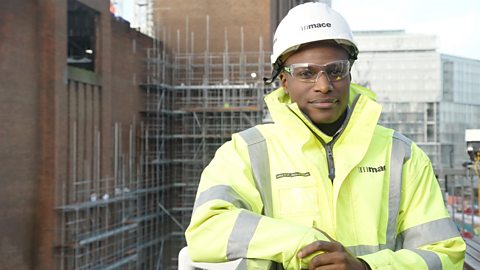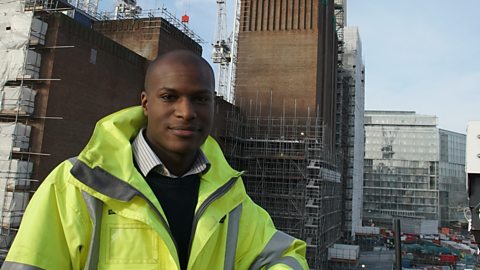Meet Abdullah, 21, who works as a construction manager in London. Part of our Bitesize world of work series.

Coming into an industry which I had no previous experience in was a difficult transition.

What is your job?
Managing construction operations on site for Mace, an international construction and consultancy company. Supervising works, organising and planning future works, and maintaining health and safety. I do site walks to coordinate the day-to-day activities.
What skills do you need?
Communication is really important ā you have to be able to communicate effectively with anyone and everyone. Leadership skills as well ā if youāre managing an area you have to be able to lead people and work with different personalities. I also need technical skills in construction so I can understand the work that happens on site.
Which subjects did you study?
For my GCSEs I did Triple Science, English, French and Geography. At A-level I did Biology, Chemistry, Maths and English Literature. The qualifications helped me get the job, but also the impression that I made in the interview. Last year I finished an HNC in Construction, which is a two-year course. This year Iām doing a Level 6 NVQ.
Is this the job you always wanted to do?
No. I sort of stumbled my way into it, after taking a year out after finishing my A-levels. I looked at different opportunities and this one stood out to me because of the versatility of the job and the ability to travel around the world and do the job anywhere.


Top tip
- Working hard and getting your qualifications will support you in whatever career you decide to go into
- Going into work can be a big step. Don't worry ā you will gain confidence over time.

What to expect if you want to be a construction manager
- Construction manager average salary: Ā£27,000 to Ā£65,000 per year
- Construction manager typical working hours: 41 to 43 hours per week
What qualifications do you need to be a construction manager?
You could get into this role via a university course or a degree apprenticeship. You'll usually need one to two A-levels, or equivalent, for a foundation degree or higher national diploma and two to three A-levels, or equivalent, for a degree. Alternatives to A-levels include taking a T-level (England-only), which is equivalent to three A-levels. Check with your course provider which alternative qualifications they accept. You can also work towards the role or apply directly if you have relevant experience.
Sources: LMI for All, National Careers Service,
This information is a guide and is constantly changing. Please check the for the latest information and all the qualifications needed and the for more on T-levels.
Find out more on the Prospects website about the role of a .
For careers advice in all parts of the UK visit: , , and .


Find work experience placements with Workfinder.
Tips and advice
Help with interviews, writing a CV and all things work experience related.


Careers in construction. collection
Find out what you could expect from a role in the construction sector.

Zoe: apprentice site engineer. video
Zoe's helping to build a London tube station.

Kawsar: civil engineering apprentice. video
Kawsar's a civil engineering apprentice for Transport for London.
